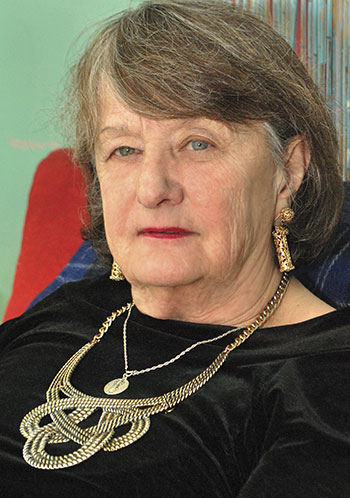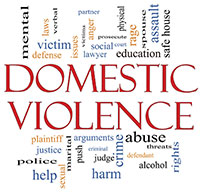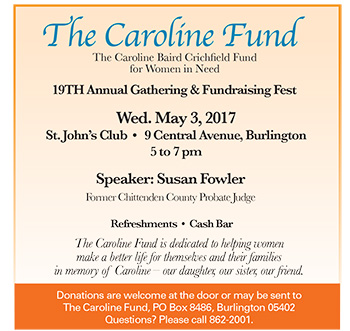| The Work That’s Never Done: An Interview with Sandra Baird | |||
| by Michelle A.L. Singer | |||
|
|||
Baird, 76, has been at the center of major moments in the women’s movement. She was part of a committee of women and men who founded, in 1972, the first clinic in Vermont (and possibly the United States) to offer legal abortions—before Roe v. Wade, which was decided in 1973. She also helped pass legislation to provide civil remedies for the victims of domestic abuse. An antiwar activist, Baird believes that war is the ultimate act of violence against men, women, and children. She feels that the best way to avoid war is to engage in people-to-people exchanges with other countries, especially those who have been defined by our government as adversaries. While a professor at Burlington College, she directed the colleges overseas studies program to Cuba and has established sister city programs in the Middle East and in Cuba. Baird has been fighting the fight, from every important angle, for over 45 years. Vermont Woman recently spent time with Baird to discuss the current status of women and where we need to go from here in addressing women’s rights. |
 |
||
No. When I was first involved in the law, I was a law clerk and paralegal. I studied the law at Vermont Legal Aid; I didn’t go to law school. In Vermont one can read the law for four years under the supervision of an attorney and take the bar. I passed the bar in 1977 and became a licensed attorney. At that time, there were no civil proceedings to protect women from domestic violence. All a victim could do to protect themselves against domestic violence was to call the police. And all the police could do, if they found evidence of abuse, was to arrest the husband or partner. While occasionally the perpetrator of the abuse is female, in the vast majority of cases, males are the ones who are the abusers. Criminal laws back then were the only laws in place. Through the efforts of feminists and those who support them—I was one of those feminists—we succeeded in passing laws that made the victims of domestic violence also protected by a civil proceeding called the Relief from Abuse Act in Title XV. That new civil proceeding allowed the victim of abuse, usually a woman, to immediately obtain a restraining order from a judge, removing an abuser from the house or restraining him from any contact with the victim. We thought that would be helpful, and I suppose it is, but the numbers of women who are abused have not come down. What that requires, especially internationally—I always try to have an international perspective—is a change in attitudes about women. Baird: First, most men have not changed their attitudes about women. Some men never had the attitude that they needed to control women, and some men have changed. In general, male attitudes about women across the world have not changed. What I think the basic problem is that what it means to be a man, a male in most societies, is that you control women. Until that attitude changes, that women are to be controlled by men, change is not going to happen. How many times have we heard the statement, before a violent crime against a woman, “if I can’t have you, no one can”? Violence is a way to control women. Until women are perceived as independent bodies on their own, free of the control of males, church, or state, violence against them is not going to diminish, and it certainly hasn’t lessened in the world. A group of women and I put together an International Women’s Day celebration to help change attitudes about women and girls and to help teach that women are to be respected and valued; women are separate whole beings, not bodies to be controlled, especially in their reproductive lives. Women are not reproductive commodities. They have to be allowed the ability to control their own destiny; that means controlling their own pregnancies. Women will never be respected unless they are in control of their reproductive lives. Women, like men, have moral agency; they should be trusted to make their own decisions. I was involved in the founding of the first abortion clinic in Vermont, and maybe in the country, in 1972 in Colchester, before Roe v. Wade. At that time there was an important decision from the Vermont Supreme Court which stated that while it was against the law for a doctor to perform abortions, there was no crime for a woman to perform her own abortion. That case went to the Vermont Supreme Court and I was there the day of that decision. I wasn’t a lawyer at that time. The decision was that the law was contradictory and was in a sense off the books. This was summer or fall of 1972. The legislature was reconvening in January and we believed that the lawmakers might outlaw abortion again. In the short period of time before January we formed the Vermont Women’s Health Center, which offered legal abortions. I was part of that group. It’s still there. Now do many people know that history or how we had to fight for the right for woman and girls to have control over their bodies and destinies? We had to fight like hell for that. |
|||
 |
|||
|
No. I hope so, but I don’t think so … Misogyny or the fear and hatred of women is still strong. Religion supports it. All the major institutions of society support it. When you’re talking about the future being female, think about places in Africa, Asia, or the Middle East where women are subjected to female genital mutilation. Or in other parts of the Americas which makes abortion criminal, even for the pregnant woman, and puts her in jail for abortion. There’s one country that recognizes the right to abortion, and that’s Cuba, although there are movements for reform in other countries. Unless women and those who love them and have concern for their human rights fight for them, I don’t have any great hope.
Where are women and men who fight for women? That’s the real challenge. Change is up to them. We’re never going to have any power or freedom without a demand.
Persistence. I don’t believe that women have a great deal of solidarity around their own issues. I was involved in the women’s movement, and bottom line we all agreed on reproductive rights—that a pregnant woman had to have the right to control her pregnancy, including terminating it. I was in groups with Madeleine Kunin, and we didn’t agree about all issues, but that was the bottom line: we were 100 percent in agreement that women had to control their own bodies and their own pregnancies in order to be free. There’s no way on earth that women can be subjected to numerous and often unwanted pregnancies and yet control their fate. It’s not a public policy issue. It’s an individual right for pregnant women. No. Many feminists and human rights activists would agree about reproductive rights and still say it’s not the most important issue. I think it’s the most important human right for the majority of the population of the planet to have. Many other important issues would be solved if women had control over their own pregnancies. If women could decide how many children to have, that decision would go a long way to solve the population problem and then solve a lot of the environmental problems. Wouldn’t that then be a solution to many of the health problems of the world and education problems? Wouldn’t control over pregnancy free women to participate as citizens in society? They would then be able to make decisions that were helpful to the world. But most of the world does not recognize a woman’s right to control [her] pregnancies. In the world, most women don’t even have access to birth control. The main thing about Roe v. Wade, the importance of it, was that it gave the control of that issue to individual pregnant women, and that’s where the right should be based. I had a discussion with Peter Clavelle when he was mayor. He was giving a political talk, and he knew he was going to be attacked by antichoice forces. I said, “Peter, just say, ‘I trust women to make those decisions.’ There’s no argument with that.” And he did, and he didn’t get an argument. One fanatic said something like, “Peter, even with late-term pregnancies?” and he said, “I trust women and their doctors to make the right decision.” End of argument. I don’t know. I don’t represent everyone in the world, but I haven’t seen much change. If you’re getting beat up, you need to leave the relationship. I’m not blaming anybody for not; my mother was a battered woman, and she never left. She was a Catholic, and she was totally committed to making her family work, and that’s not bad. That’s not a wrong attitude. It’s just dangerous. |
|||
 |
|||
|
In this country, women have opportunities; in other countries they don't. It's different if you have an international perspective or if you're talking about the United States, England, and so forth. Do women have more opportunities? Here they do, I suppose. Although certainly a poor black woman doesn't. Or a poor white woman. They don't have the opportunity to obtain welfare any more, or to have the same opportunities to have equal pay with men or jobs. Poor people don't have more opportunities, of any gender, and certainly internationally they don't. I think there's a lot of work to do. I'm very active in creating programs in Cuba. I founded a peace organization in Cuba, the Cuban American Friendship Society, because I am passionately antiwar. I've been involved with Cuba since 1981, trying to make citizen-to-citizen exchanges to bring a decent policy of neighborliness and friendship toward Cuba rather than the hostility which has been our government's policy since Cuba became socialist in 1959. I have been part of the Sister City Burlington-Bethlehem-Arad Program helping to make a difference in the Middle East. I am also working to expand the work of the Caroline Fund, especially the Pro Se Legal Clinic, and I am still acting as a lawyer. I'm involved in the antiwar movement with the Women's International League of Peace and Freedom. I've also always done commentaries. I used to be on the radio, but now I do a commentary on Channel 17, and I also do a discussion group about politics on Channel 17. That's all I can think of to do. The world better shape up.
|
|||
|
Michelle A.L. Singer lives in East Montpelier with her husband, three children, parents, dog, two cats, and seven chickens.
|
||

